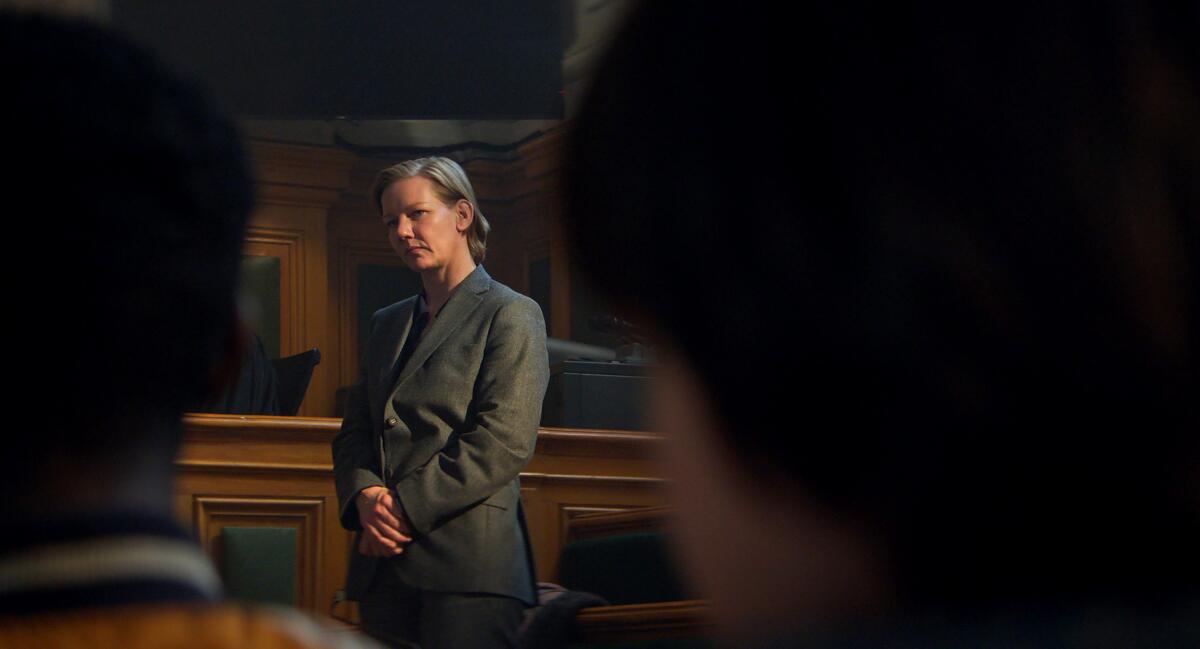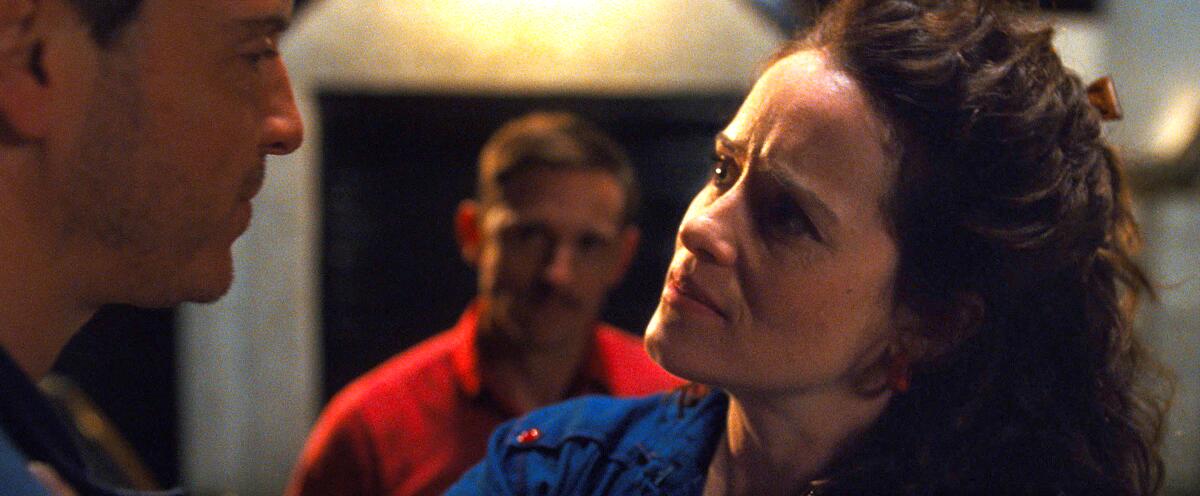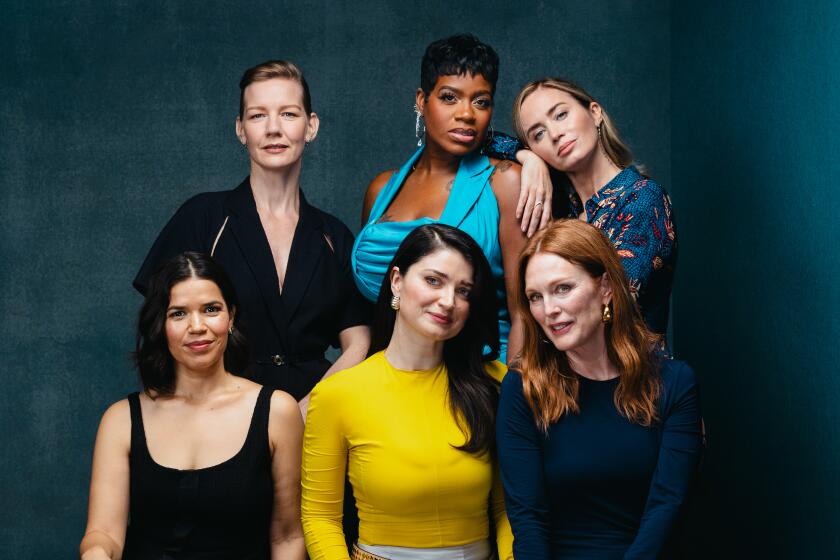‘Past Lives,’ ‘American Fiction’: Writers write what they know, namely, writers

- Share via
This past film season, a number of screenwriters played close to home, creating or adapting writer characters for their movies. In “Anatomy of a Fall,” “American Fiction,” “Past Lives,” “All of Us Strangers,” “Origin,” “You Hurt My Feelings” and “Afire,” the protagonists’ careers aren’t incidental; they’re integral to the characters’ identities. In so doing, their progenitors aren’t only using their films to reflect on society; they’re holding up mirrors to their own lives and careers. The writers directed their films as well, giving them a level of control over the material that most screenwriters don’t usually have.
The Oscar-nominated “Past Lives,” by playwright and first-time filmmaker Celine Song, is arguably the most autobiographical of the group. Song mined her own background to devise Nora (Greta Lee), a married New Yorker by-way-of Seoul and Canada who meets up with her South Korean childhood sweetheart Hae Sung (Teo Yoo). “Since it really was inspired by an autobiographical moment, it felt untrue to give her some other cool job, than the cool job that I do have, being a playwright,” says Song.
She used her story to explore themes of identity, ambition and the immigrant experience, all of which are deeply connected to the writing life. “Being a writer is so often a transformative thing, because you’re so deep in the worlds of the characters and the story that you’re telling, you can dive into anything.” Song adds that historically, “most writers have been immigrants of some kind, even if it means moving to a different part of the same country.”
Notably, Nora’s husband, Arthur (John Magaro), is a writer as well — as is Song’s. Not only does Arthur understand her meeting up with Hae Sung, he jokes that it makes a great story, casting himself as the villain. “You can see she’s better with Arthur,” she says. “He gets her.”

A writing couple is also central to “Anatomy of a Fall,” but with tragic results. “It was absolutely crucial” that Sandra and Samuel (Sandra Hüller and Samuel Theis) were both writers, says director Justine Triet, who wrote the script with her husband, filmmaker Arthur Harari. It sets up Samuel’s jealousy and frustration about Sandra’s greater success, and the tales people create throughout the film.
Fantasia Barrino, Emily Blunt, America Ferrera, Eve Hewson, Sandra Huller, Julianne Moore offer insights into their work.
When Samuel dies in a fall from a window, Sandra is put on trial for his murder, and two more fictional narratives arise. “Sandra’s lawyer Vincent, played by Swann Arlaud, tells her, ‘The truth is not so important, what is important is the story we’re going to tell,’” Triet says, speaking from her home in Paris, with Assia Turquier-Zauberman translating.
The aggressive prosecutor (Antoine Reinartz) makes up a fiction of his own, which includes excerpts from Sandra’s novel in which a woman kills her husband. “When you are in the writing process you are totally free, and you can make up anything,” Triet says. Picturing her own stories used against her “was the worst thing that I could imagine, because of course it’s not the reality.”

The stories forced on writers is a theme in “American Fiction,” as well as first-time filmmaker Cord Jefferson’s own experience. When he read Percival Everett’s novel “Erasure,” he felt an immediate kinship with the character Thelonious “Monk” Ellison, an author simmering with resentment at the publishing industry’s efforts to put him in the category of Black Writer, with commensurate approved topics. “There’s this really limited perspective as to what Black life looks like and what Black stories are,” Jefferson notes.
He adds that, like Monk (played by Jeffrey Wright) and most creative types, “I’m deeply insecure. It’s hard to write, there is a lot of professional jealousy. Monk being frustrated that his work is not more celebrated, while also resenting the author Sintara, played by Issa Rae, those were parts of the writing life for me.”
For all the focus on writers, we rarely see anyone at work. Song shot an entire sequence of Nora writing, but when watching the edit, realized it looked like she was trying too hard to prove Nora was a writer, and cut the sequence. Ultimately, “this story is about what happens to a writer, not about writing.”

Andrew Haigh’s “All of Us Strangers,” based on Taichi Yamada’s novel “Strangers,” features one of the more accurate film depictions of a writer not writing. Sitting at his computer, isolated screenwriter Adam (Andrew Scott) tries to start in on a script. Haigh then cuts to Adam sitting on his couch, eating junk food and watching junk TV until the wee hours.
When Monk decides to write a parody of what’s expected of him, Jefferson wanted to show him writing realistically — even when Monk’s characters (played by Keith David and Okieriete Onaodowan) appear in front of him and act out the scene as he types, occasionally stopping to discuss his choices. “I always disliked scenes where writers are pounding at their keyboard furiously as they get down this amazing piece of work, not making any mistakes,” Jefferson says. “I wanted to get at the idea that it’s a slow, methodical process, and you go back and question yourself and question the words that you’re writing.”
Monk’s prank is taken seriously, making him rich, and making his pseudonym, Stagg R. Leigh, famous. He is in the bizarre position of being resentful and jealous of his own success. So it’s only fair that, in the end, he writes himself out of his quandary. But, in a wry nod to the vagaries of screenwriting, Monk must rewrite his own film’s ending. Twice.
More to Read
Sign up for The Envelope
Get exclusive awards season news, in-depth interviews and columnist Glenn Whipp’s must-read analysis straight to your inbox.
You may occasionally receive promotional content from the Los Angeles Times.











